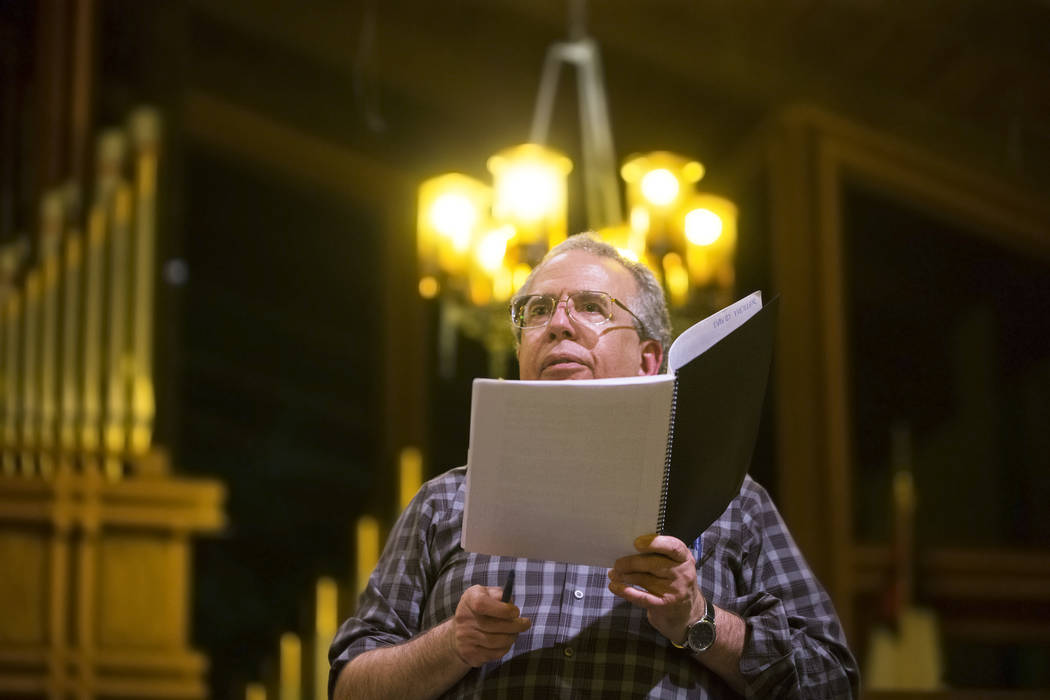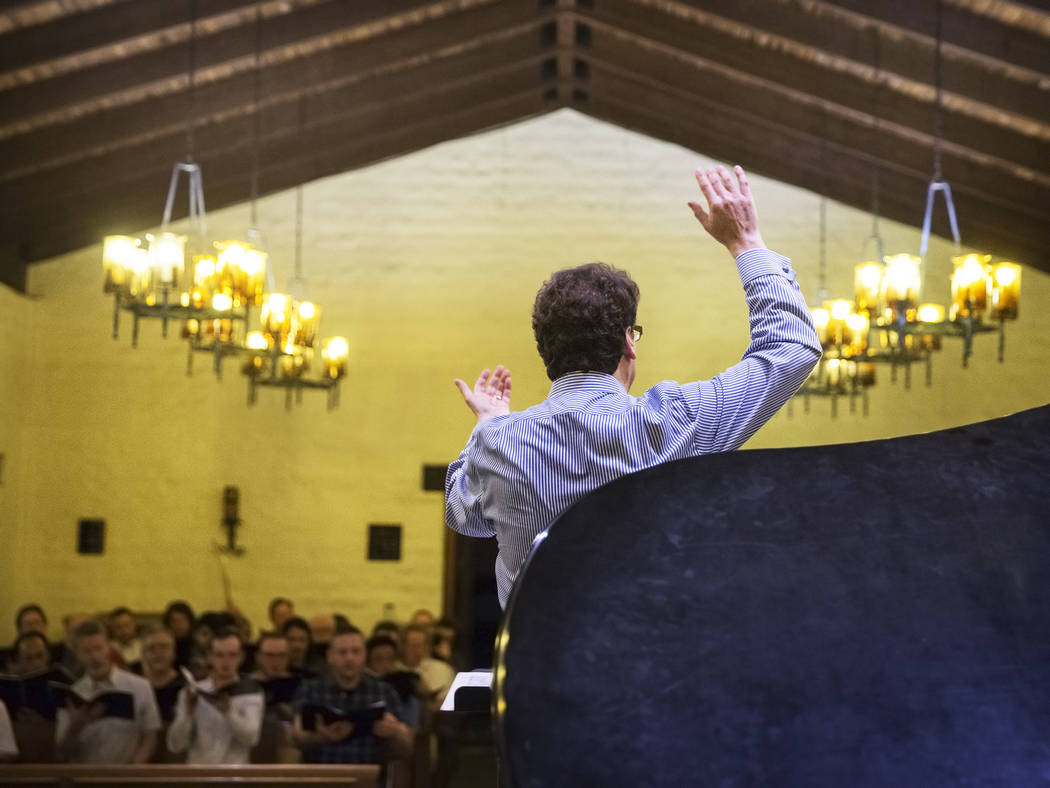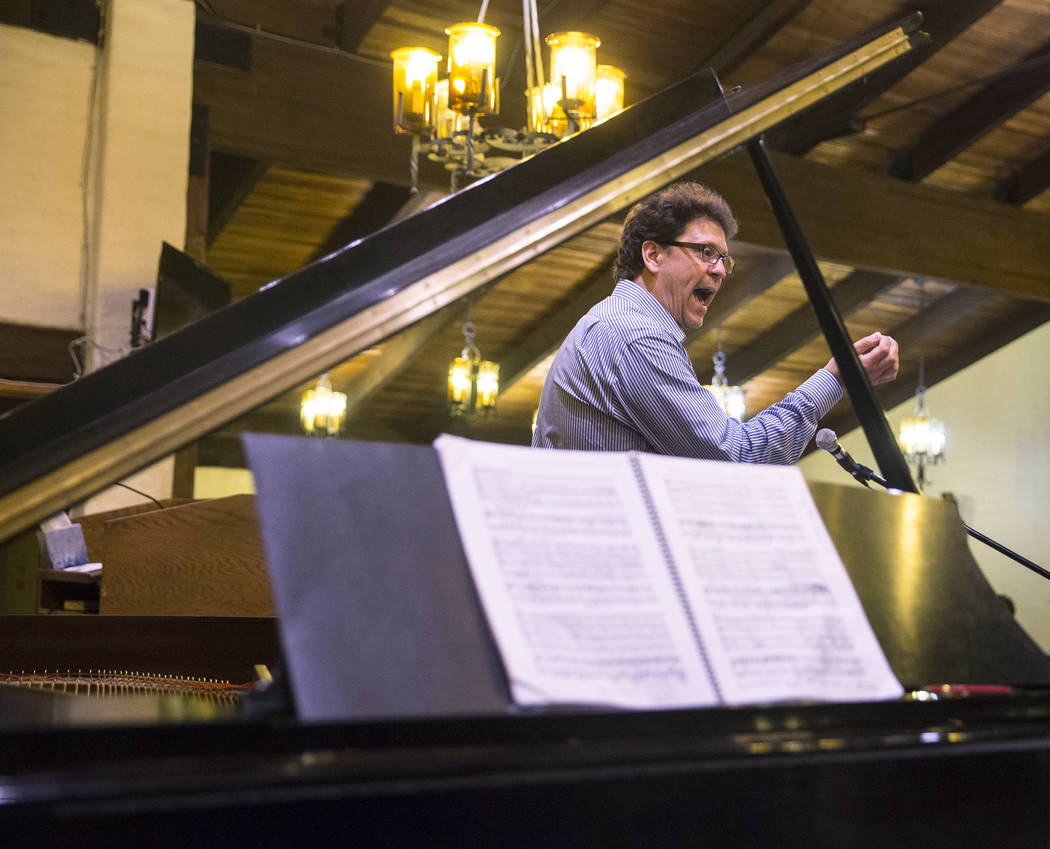Las Vegas Philharmonic, choirs combine this weekend to explore music old and new
No pressure here.
The Las Vegas Master Singers, the UNLV Concert Singers and the UNLV Chamber Chorale — about 135 voices strong — cram into the sanctuary of University United Methodist Church on a recent weeknight.
It’s their first combined rehearsal with Las Vegas Philharmonic music director Donato Cabrera, who’s conducting them — along with the orchestra — in Saturday’s Smith Center performance of Brahms’ “A German Requiem.”
They’ve already warmed up under the direction of David Weiller, UNLV’s director of choral studies, who conducts the Master Singers — and has been working with the singers since January on “A German Requiem.”
Now, Cabrera faces them from the church pulpit, telling them that he and Weiller “have been dreaming about this piece,” which he describes as “one of the great masterpieces of all music — not just choral music.”
Yet as Cabrera takes the singers through the score, with Weiller interjecting observations, the soaring melodies and resonant harmonies underline Cabrera’s assessment.
“It’s really an uplifting work to sing,” Weiller says.
But also a challenging one.
Beyond its status as “a very demanding piece vocally,” the challenges include “the harmony, the range, the breath control,” the choir director explains. Not to mention “the challenge of singing in German — and the emotional quality of the text.”
For Cabrera, “it’s one of my desert island pieces.”
In part, that’s because of “its universal message. Brahms was quoted as saying he wished he could change the title to ‘Human Requiem,’ ” Cabrera explains. “He purposely wrote a requiem that didn’t have any specific religious” connection, because Brahms wanted this requiem sung by and meant for everyone.
As the massed choir rehearses, Cabrera stops the music at frequent intervals, offering observations on breath control, tone and other issues.
“Basses, where are you?” he wonders at one point. “Pretend you’re in Sicily — machismo! C’mon basses!” When the bass singers respond to his satisfaction, Cabrera comments, “now we’re talking,” then coaches the tenors with a single name: “Pavarotti,” the late great Luciano.
“There we go! That’s singing!” Cabrera encourages the choir members. “Now imagine you’re all one person.”
Brahms’ “German Requiem” may be a masterwork, but it’s also problematic to program, Cabrera observes, because of its 70- to 75-minute length.
Enter Robert Schumann’s Overture, Scherzo and Finale — which is another difficult programming choice, because it’s so short.
Despite being “one of his greatest pieces,” Cabrera says, “it’s too short to be a symphony and too long to be an overture.”
Rarely performed, the Schumann fits with Saturday’s Philharmonic program thematically, the conductor explains. In part, that’s because it shows the relationship between Schumann and Brahms, which began when the 20-year-old Brahms showed up at the already-established Schumann’s door, launching a close friendship. (Not to mention Schumann’s proclamation that the unknown Brahms was a musical genius.)
Leading off Saturday’s concert: the premiere of Las Vegas composer Jennifer Bellor’s “898 Hildegard,” which also features the Master Singers and the Philharmonic.
To Cabrera, having the opportunity to work with the human voice in any capacity offers Philharmonic members “an incredible opportunity” because instrumentalists are often told, “you need to sing through your instrument,” he says. “And the best way of learning how to do that is to play with singers.”
Read more from Carol Cling at reviewjournalcom. Contact her at ccling@reviewjournal.com and follow @CarolSCling on Twitter.
Preview
What: Las Vegas Philharmonic with Las Vegas Master Singers, UNLV Concert Singers and Chamber Chorale
When: 7:30 p.m. Saturday (6:30 p.m. pre-concert conversation)
Where: Reynolds Hall, The Smith Center for the Performing Arts, 361 Symphony Park Ave.
Tickets: $30-$109 (702-749-2000, www.lvphil.org or www.thesmithcenter.com)




















































